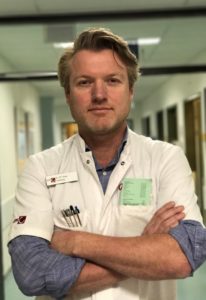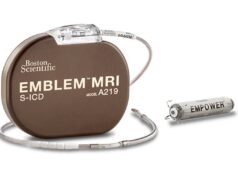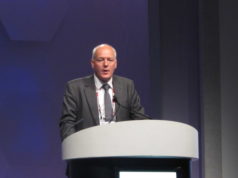
Six-month results from the ongoing pivotal MODULAR ATP clinical trial assessing the Boston Scientific’s mCRM modular cardiac rhythm management (CRM) system were presented at the Heart Rhythm Society (HRS) annual meeting (16–19 May, Boston, USA).
The system consists of the Emblem subcutaneous implantable defibrillator (S-ICD) system and the Empower leadless pacemaker, which are designed to work together wirelessly to coordinate painless intracardiac anti-tachycardia pacing (ATP) therapy, provide rate-responsive bradycardia pacing support and to prevent sudden cardiac death without the risk of leads in the heart or under the sternum.
In addition to evaluating the safety and performance of the Empower leadless pacemaker as a standalone pacemaker, the trial evaluated the ability of the Emblem S-ICD system to successfully communicate a wireless request to the leadless pacemaker to deliver ATP therapy.
Findings from the trial met all pre-specified six-month safety and effectiveness endpoints, and demonstrated a major complication-free rate of 97.5% after implantation of the Empower leadless pacemaker and a communication success rate of 98.8% from the Emblem S-ICD system to the Empower leadless pacemaker.
The trial also demonstrated an ATP success rate of 61.3%, and no patient requests for deactivation of ATP or bradycardia pacing due to pain or discomfort. Pacing capture thresholds, which indicate stable device fixation within the heart, of ≤2.0V at 0.4ms in 97.4% of patients.
“We saw excellent overall clinical performance of the mCRM system in this study, including a high rate of communication success from the S-ICD to the leadless pacemaker, and a low rate of major leadless pacemaker complications,” said Reinoud Knops (Amsterdam UMC, Amsterdam, The Netherlands). “These findings are noteworthy, as high percentages of communication success and pain-free termination of spontaneous arrhythmia episodes indicate a potential upgrade pathway for patients currently implanted with an S-ICD who develop a need for ATP or pacing.”
Also presented at Heart Rhythm 2024 were results from the APPRAISE ATP clinical trial—a prospective, randomised, multicentre study evaluating ATP as a primary strategy for terminating ventricular tachycardias in primary prevention patients (i.e., those without a history of spontaneous sustained ventricular arrhythmias).
The trial enrolled 2,626 primary prevention patients indicated to receive an ICD at 134 centres globally and is the largest head-to-head trial of ATP in this patient group.
In the study, patients were randomised 1:1 to standard transvenous-ICD therapy—ATP plus an ICD-delivered shock to terminate a ventricular tachycardia—versus shock only. Across five years of follow up, data demonstrated a statistically significant, but small absolute first all-cause shock reduction in only 1% of patients per year. Shock burden, or the number of shocks experienced by a patient, was not significantly different between the two arms, and the vast majority of patients in the ATP-plus-shock arm did not require ATP therapy.
“Together, data from the MODULAR ATP and APPRAISE ATP trials reinforce the promise of the groundbreaking mCRM system, illustrating a clear path forward for physicians to offer therapies that prevent sudden cardiac death and deliver ATP for the small number of patients who benefit from it,” said Kenneth Stein, senior vice president and global chief medical officer, Boston Scientific. “Instead of subjecting all patients to the risks of more invasive approaches, such as placing leads in the heart or tunnelling them under the sternum to provide therapies they might not require, these data indicate physicians may have the opportunity to tailor therapy to the patient’s individual needs and health.”









